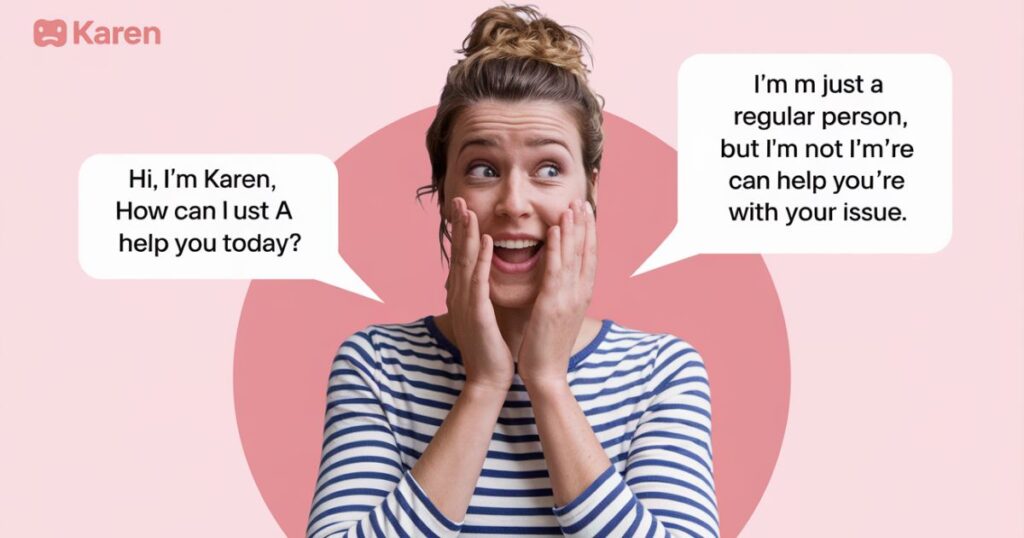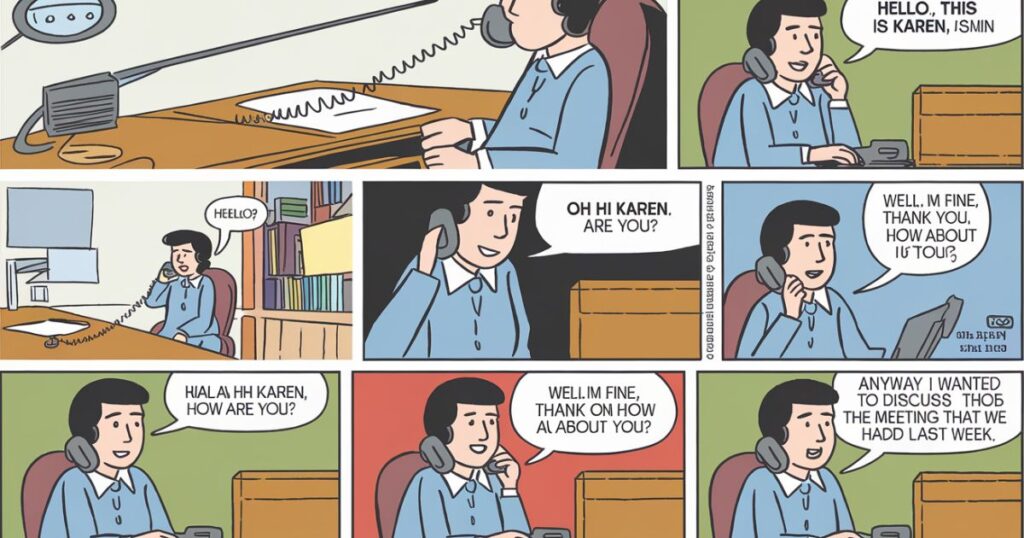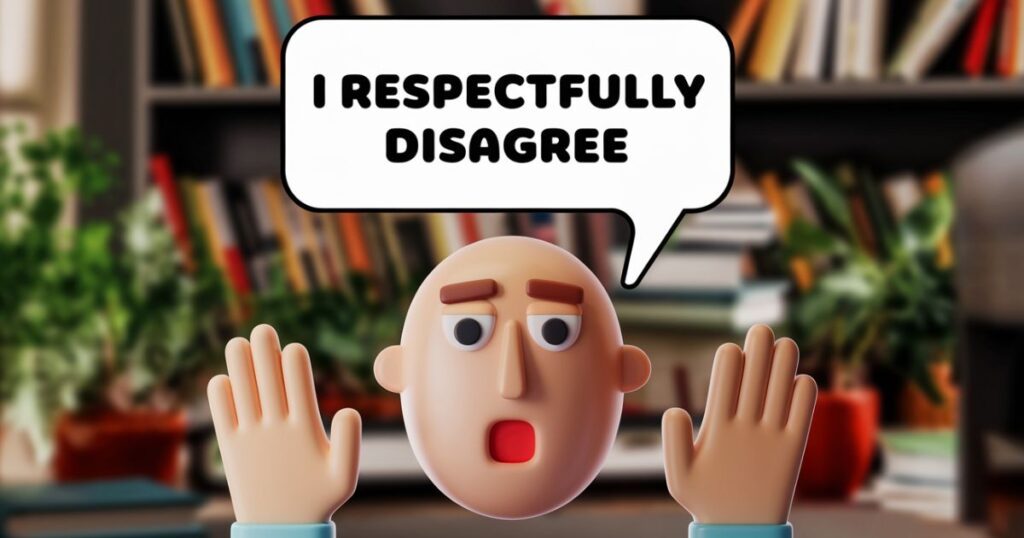The term “Karen” has evolved over the years and is now used to describe someone who is perceived as entitled, demanding, or unreasonable. In 2024, it can still be hurtful when used as an insult, often implying someone is acting out of privilege or being difficult in public situations. If someone calls you a “Karen,” it’s important to handle the situation calmly and thoughtfully.
When faced with this label, the way you reply can make a big difference. It’s a good idea to stay calm and avoid reacting defensively. You can choose to address the comment with humor, ask for clarification, or simply walk away. Your response can help diffuse the situation and shift the conversation in a more positive direction.
What does being a ‘Karen’ mean?
The term “Karen” is often used to describe a person, usually a middle-aged woman, who acts entitled or demanding. This stereotype is associated with someone who complains often or tries to use their privilege to get their way. A “Karen” might be known for asking to speak to the manager or behaving rudely in public.
Over time, the name “Karen” has become shorthand for someone who exhibits these behaviors. It’s often used on social media to call out actions that seem unreasonable or selfish. While some people use it humorously, others feel it’s a harsh label that unfairly targets certain women.
Read Also: 50+ Professional Replies to ‘Sorry for the late Response’
What to Say When Someone Calls You Karen? 30 Best Replies

When someone calls you “Karen,” it can feel offensive, especially if it’s meant to label you as entitled or rude. The key is to stay calm and not react emotionally. A simple response like, “I’m not sure why you feel that way, but let’s talk about it” can diffuse tension. It’s important to remain polite and avoid escalating the situation.
- “I’m sorry you feel that way. Let’s work through this calmly.”
- “Wow, that was unexpected! Let’s talk it out.”
- “I didn’t realize I was giving off that vibe. Let’s clear it up.”
- “Not sure why you’d say that, but let’s move forward respectfully.”
- “Can we have a productive conversation instead?”
- “I’m not a Karen, just someone having a tough day!”
- “Maybe we should both take a deep breath.”
- “If I’ve upset you, let’s fix it.”
- “Let’s reset and approach this differently.”
- “I didn’t mean to come off that way. Can we talk about it?”
- “I can assure you, I’m not trying to be difficult.”
- “It sounds like we had a misunderstanding. Let’s clear it up.”
- “I hear you, but name calling isn’t helpful.”
- “Let’s skip the labels and figure out what went wrong.”
- “That’s a bit harsh, don’t you think?”
- “I’m open to talking if we keep it respectful.”
- “Is there a reason you’re calling me that? Let’s discuss it.”
- “Let’s get past this and solve the issue.”
- “I’d prefer if we kept this conversation respectful.”
- “I don’t appreciate being labeled, but I’d like to fix the situation.”
- “I’m not trying to cause trouble, so let’s work this out.”
- “I’m not a ‘Karen,’ just trying to communicate.”
- “How about we discuss the issue without name-calling?”
- “That’s not the way I see myself, but let’s talk.”
- “I didn’t mean to come across that way, let’s figure things out.”
- “Wow, I didn’t realize I was being seen like that. Let’s fix it.”
- “I’d appreciate it if we could leave name-calling out of this.”
- “I’m not here to argue, just want to resolve this.”
- “We might have misunderstood each other. Let’s talk it over.”
- “Calling me names doesn’t help. Let’s communicate better.”
- “I don’t think this is helpful. Can we reset?”
- “Let’s put the labels aside and focus on the issue.”
- “I’m not trying to be a ‘Karen,’ I just want to be heard.”
- “I hear your frustration. Let’s resolve this constructively.”
- “I didn’t mean to come off that way. Can we talk?”
- “It seems we’ve misunderstood each other. Let’s fix that.”
- “I’m not trying to cause problems, so let’s work this out.”
- “Let’s step back and reset the conversation.”
- “I don’t appreciate being called names, but let’s solve the issue.”
- “I can see you’re upset. Let’s talk it through calmly.”
Tips to Respond When Someone Calls You Karen

If someone calls you a “Karen,” the first step is to stay calm. Reacting with anger or frustration can escalate the situation. Take a deep breath and avoid engaging in a heated argument.
1. Stay Calm
Staying calm helps you think clearly. When you’re calm, it’s easier to make good decisions. It also keeps your body relaxed and healthy.
2. Access the Situation
When facing a situation, the first step is to observe carefully. Take note of what’s happening around you. Pay attention to the details before making any decisions.
Once you understand the situation, think about your options. Consider the possible outcomes of each choice. This will help you make a better, more informed decision.
3. Focus on the Issue
When solving a problem, it’s important to focus on the issue at hand. Don’t get distracted by side topics or irrelevant details. Clear thinking helps find a solution faster.
Concentrating on the issue allows you to see things more clearly. Avoid bringing up past problems that aren’t connected. Staying focused ensures you stay productive.
4. Express Disagreement Respectfully

When you disagree with someone, it’s important to stay calm. Listen carefully to their point of view before responding. Acknowledge their opinion, even if you don’t agree with it.
Share your thoughts without attacking the other person. Use “I” statements, like “I feel” or “I think.” This way, you avoid making the conversation feel personal.
5. Request Respectful Communication
Respectful communication means treating others kindly. It involves using polite words and listening carefully. This helps create a peaceful and understanding environment.
When we communicate respectfully, everyone feels valued. It reduces misunderstandings and builds trust. Let’s always aim to speak with care and empathy toward others.
6. Correct Misunderstandings
Misunderstandings happen when people don’t communicate clearly. They can lead to confusion and hurt feelings. It’s important to address them quickly.
To correct misunderstandings, ask questions. Listen carefully to what others say. Clear communication helps everyone feel understood.
7. Set Boundaries
Setting boundaries is essential for our well being. They help define what we are comfortable with. Boundaries protect our time and energy.
When we establish clear limits, we communicate our needs. This improves our relationships with others. Healthy boundaries lead to greater respect and understanding.
- Setting boundaries is a form of self care.
- Clear boundaries improve communication with others.
- Saying “no” can help protect your time and energy.
- Boundaries help establish respect in relationships.
- They prevent feelings of overwhelm and burnout.
- It’s okay to adjust boundaries as needed over time.
- Healthy boundaries promote personal growth and self-awareness.
- Being assertive about your limits is empowering.
- Boundaries allow you to prioritize your needs and well-being.
- Respecting others’ boundaries fosters a positive environment.
8. Reflect on Feedback

Feedback helps us learn and grow. It shows us what we are doing well and what needs improvement. Taking time to reflect on feedback can lead to better results.
After receiving feedback, it’s important to think about it carefully. Consider how you can use it to improve. Making small changes can have a big impact on your work.
9. Educate Yourself

Education is the key to personal growth. It opens doors to new opportunities. Learning can happen anywhere, anytime.
You can educate yourself through books, online courses, and discussions. The more you learn, the more confident you become. Embrace curiosity and seek knowledge every day.
10. Promote Understanding
Promoting understanding helps people connect. It allows us to share ideas and learn from each other. When we listen, we can build trust and respect.
Education is a key part of promoting understanding. It helps us see different perspectives. By learning about each other, we can create a better world.
Final Thoughts
In conclusion, responding to being called a “Karen” can be challenging but also an opportunity for humor and self-reflection. Whether you choose to embrace the label with wit or address it directly, it’s important to remain confident and true to yourself.
Using clever comebacks or lighthearted replies can diffuse tension and even spark meaningful conversations. Ultimately, understanding the context of the term can help foster empathy and create a more constructive dialogue around the stereotypes associated with it.
FAQs
Don’t be Karen?
“Don’t be a Karen” serves as a reminder to avoid entitlement and demanding behavior that disrespects others. Instead, practice empathy and understanding in your interactions.
What does being a Karen mean in slang?
In slang, being a “Karen” refers to a woman who exhibits entitled or demanding behavior, often towards service workers. It can also imply a lack of awareness or sensitivity to social issues.
What is required to overcome Karen’s calling?
To overcome being called a “Karen,” it’s essential to remain calm and respond with humor or assertiveness. Engaging in open dialogue and showing empathy can help address misunderstandings and stereotypes.
My boyfriend called me Karen. What to do?
Talk to your boyfriend about why he used the term and how it makes you feel. Clear communication can help address misunderstandings and strengthen your relationship.






